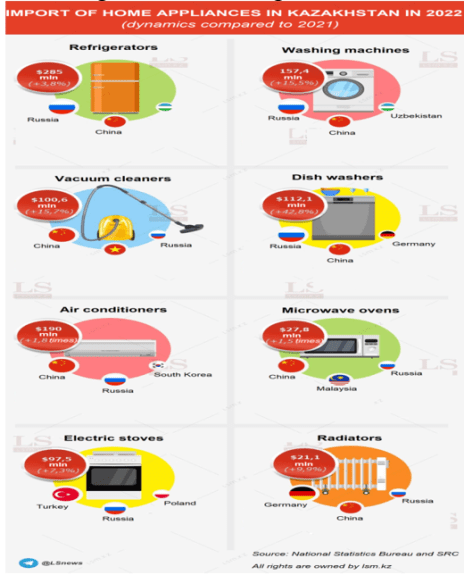China & Vietnam Take Part Of Russia’s Market Share In Kazakhstan Household Appliance Exports
Opportunities for Asian exporters to look to Central Asia as Russian appliance exports decline
Imports of household appliances to Kazakhstan from Russia decreased in 2022, while those from China grew. A little more than a year has passed since the Russian conflict with Ukraine began and sanctions were imposed. As a result, established logistics routes were disrupted, which affected the supply of goods. This, in turn, has affected the trade patterns between Central Asia countries, Russia and China.
For example, imports of refrigerators and freezers from Russia decreased by 41.4%, while those from China and Uzbekistan grew by 22.9% and 45.4%, respectively. Part of this is due to Russia having been cut off from the SWIFT banking network with buyers unable to pay for Russian products.

Washing machines also began to be imported more by Kazakhstan from China – increasing 3.9 times and Uzbekistan by 0.2%, while deliveries from Russia decreased by -32.8%.
Kazakhstan also began to buy more vacuum cleaners from China, showing an increase of 38.9% and from Vietnam by 14.3%. Meanwhile, deliveries from Russia decreased by 16.4%.
Kazakh imports of dishwashers increased by 42.8%. The main supplier, despite the decline (-36.4%), remained Russia. Imports from Germany also decreased by -33.7%.
The supply of electric stoves in Kazakhstan, on the contrary, increased by 7.3%. Most were imported from Russia, but the volume itself was reduced by -41.9%. Ceramic plates were also transported from Turkey (+16.2%) and Poland (+16.1%).
The statistics illustrate the need for manufacturers throughout Asia, especially of household items, to look at expanding their export sales to markets impacted by the situation in Ukraine. Of note is the increase of Vietnam’s exports of vacuum cleaners to Kazakhstan. The two countries may seem far apart, but savvy Vietnamese exporters have been paying attention – Vietnam has a free trade agreement with the Eurasian Economic Union – which includes Kazakhstan. Applying market research and taking advantage of the operational trade agreements such as those with Kazakhstan can present opportunities.
While supplies from Russia and the West (such as Germany) have been impacted, supply chains from Asia are unaffected. This includes the Commonwealth of Independent States of which Kazakhstan is also a member, while Indian exporters should also be looking at the recent trade agreements its government signed with Kazakhstan last month. India’s trade agreements with other Central Asian nations impacted by a decline in imports from Russia should also be examined for opportunities.
Source: Hussein Nazarov for LS with additional commentary by Chris Devonshire-Ellis.
Related Reading





